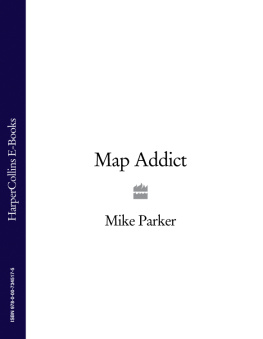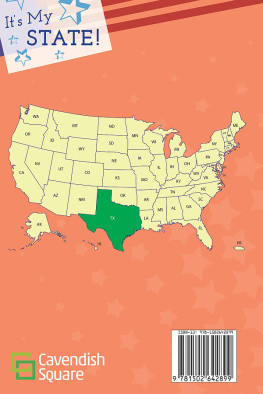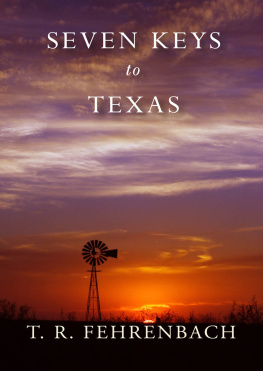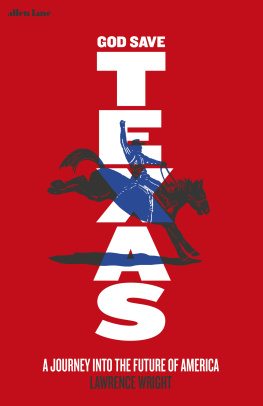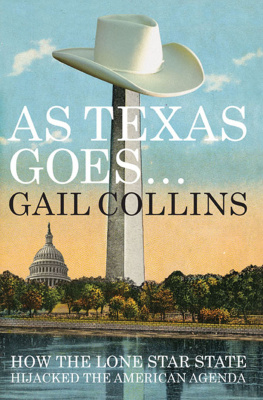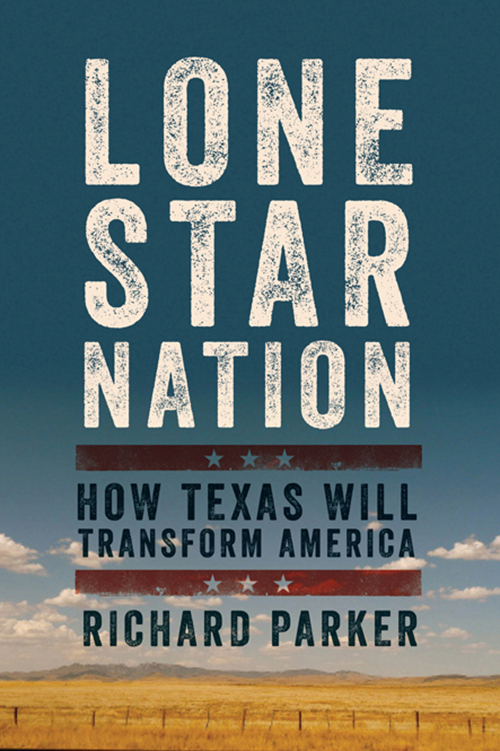
I certainly wish to thank all the people who spent their time with me; they are merely too numerous to mention here but they appear within the pages and the sources of this book. I am thankful for the time of the insightful and expert as well as that of the rest of us, too, who experience real-time history with perhaps less sweep but, perhaps, more personally. Im also intellectually in debt to some very fine writers, some of whom Ive met and others whom I never have, including the great T. R. Fehrenbach, author of Lone Star, and historian Randolph B. Campbell, author of Gone to Texas. Each so thoroughly explained centuries of history that I was afforded the luxury of focusing on the present and future.
Certainly, I must thank Claiborne Hancock of Pegasus Books for enthusiastically embracing this project by a writer entirely unknown to him at the time, introduced through the good and tireless offices of Nathaniel Jacks at Inkwell Management. Nat was careful in helping me not just find Claiborne and Pegasus but tireless in selecting just the right topic, Texas, and shaping the concept. Jessica Case at Pegasus carefully read the ensuing drafts. Jennifer McCartney did a masterful job in editing and any remaining weaknesses are my own. Showing how life works in its serendipity, Nathaniel plucked me after reading the Op-Ed pages of The New York Times, where Ive had the good fortune to be edited by Clay Risen, a former colleague at The New Republic. I thank Frank Foer, the editor at The New Republic, for publishing some of my work on Texas as well as Ray Walker, the opinion editor at the McClatchy-Tribune syndicate in Washington, D.C. Each stoked some angle of this story over time, whether they knew it or not.
Speaking of editors and colleagues, there have been many over the years but I have to thank a few of them and some colleagues who may, or may not, ever read this thanks: Erroll Laborde in New Orleans; Kent Walz, Steve Mills, Bill Hume, Joanne Angel and Chris Mora at the Albuquerque Journal; Kathleen Carroll, now running the Associated Press in New York; Dave Garlock and Lorraine Branham, formerly of the University of Texas at Austin; Greg Marx and Liz Barrett at the Columbia Journalism Review; my friend Kate Galbraith formerly of the Texas Tribune; my friend Bryan Bender of The Boston Globe and my buddy Michael Zielenziger, formerly of Knight-Ridder Newspapers. Among family and friends, Id like to thank my former father-in-law and mother-in-law, John and Suzanne Stowe of Abilene and Suzannes dear sister, Cindy; my old friends Mark Seiler and Steve Evans; photographer, close friend and fellow traveler Erik Hildebrandt; writer and friend Jeff Connaughton; James Hyde, who encouraged me to devote myself to writing again. My sister, Janet Collins is my sweet younger sibling, confidant, and very best friend. All these people inspired, critiqued, encouraged, cajoled, supported and improved me along the way. I owe a particular debt to my parents, Josefina and James, for supporting the uncertain adventure in journalism, particularly in its very shaky beginning. I am grateful for the love of my daughters, Olivia and Isabel, and the enduring kindness of their mother, my former wife, Laurie.
There is one final note to Lauries grandfather, the late Mac McCarty. Gone some years now, Mac was all the things God loves: A fisherman, an Episcopalian, a newspaperman, and an unrepentant yellow dog Democrat in the heart of the Catclaw Country of Abilene. His black, portable Remington Rand typewriter, made in 1932 and still in shiny, mint condition, stood vigil over me as I wrote this manuscript. In his later years, Mac and his beloved Essie enjoyed retirement by traveling the scenic highways and byways of their beloved Texas in their Chevy station wagon. At 5:00 P.M. precisely, wherever they were, they would pull over religiouslyfor happy hour. They wouldve gotten a kick out of this book.
All of these people made my Texas possible.
May 15, 2014
Wimberley, Texas
R ichard Parker is an award-winning journalist.
His work has appeared in the Op-Ed and Sunday Review sections of the New York Times, the New Republic, the Columbia Journalism Review and his commentary is syndicated by the Tribune Content Agency to leading news outlets in the United States and around the world. His commentary in the Times won a 2013 prize from the National Society of Newspaper Columnists. He has been appointed twice as the visiting professional in journalism at the University of Texas at Austin.
He was the associate publisher of the New Republic in Washington, D.C. As a newspaper correspondent, he previously covered conflict and crisis in the Balkans, the Persian Gulf, and Latin America, as well as reported on the Pentagon, the White House, Congress, and presidential politics in America. He has won numerous awards and fellowships for his journalism. Raised in El Paso, Texas he received a B.A. in political science from Trinity University and an M.A. in political science from Tulane University.
He lives in the Texas Hill Country outside Austin.
G rowing up in Texas left me with lots of memories but one clear-cut impression: Nothing much ever seemed to happen here.
Admittedly, the places in which I grew upfirst Laredo and then El Paso, both on the muddy Rio Grande that demarks the United States from Mexicoprobably heightened that sensation. El Paso, in particular, felt isolated, like a place at the end of the world. When I considered the things I saw, say on television, or heard about on the radio or glimpsed in the occasional newspaper it seemed as though life was happening not here but instead somewhere out there. My father traveled a lot for work. His plane tickets read: Chicago, New York, Miami, Port-au-Prince, Mexico City, and Santiago. What was going on definitely seemed out there.
By the time I had reached high school, I was quite sure that nothing of note ever happened in Texas. I rode the bus to school and on the radio heard snippets about Jimmy Carter and Ronald Reagan, the Soviet invasion of Afghanistan and the death of Pope Paul VI. The bands of the eraa bizarre concoction of pre-punk, longhair, glam rock, southern rock, and Canadians, like Styx, Journey, Sammy Hagar, Loverboy, and 38 Specialoccasionally played but seemed to prefer the air-conditioned Pan Am Center, up Interstate 10 in little Las Cruces, to the dusty cow palace that was the El Paso County Coliseum. Social life was stratified into the popular kids, who were as often as not well off; the athletes, who were as often as not popular; the cowboys; the stoners; and the Mexicans, who clung to their particular cultures. Oh, and then there was the band. The whole thing seemed to revolve around that great West Texas ritual: High school football.
That was something I tried by the time spring training rolled around at the end of my freshman year. Having played before coming to my 5A high school, a place with over 2,000 students, I realized the currency of being on the team. You were somebody. You fit in. You got to wear your game jersey on Fridays. Yet that grueling spring training in the soaring heat, frequently spent face down in the dust, being screamed at by coaches and gulping salt pills instead of wateras was the practice of the timewas probably a good lesson in the importance of the sacrificial devotion to sport itself, regardless of the outcome. It also left me with a shoulder injury after being hit by a varsity lineman who outweighed me by twice as muchI knew this as he fell on methat would mark my return to the hard metal seats of the stands. Watching was enough; it was tradition, after all, to devote a Friday night to the game and the spectacle, even as a spectator instead of an adolescent gladiator.
Next page





